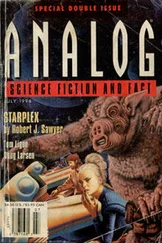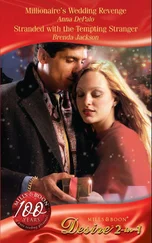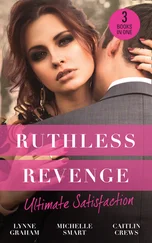Pauline Ashwell - Time's Revenge
Здесь есть возможность читать онлайн «Pauline Ashwell - Time's Revenge» весь текст электронной книги совершенно бесплатно (целиком полную версию без сокращений). В некоторых случаях можно слушать аудио, скачать через торрент в формате fb2 и присутствует краткое содержание. Год выпуска: 1995, Издательство: Dell Magazines, Жанр: Фантастика и фэнтези, на английском языке. Описание произведения, (предисловие) а так же отзывы посетителей доступны на портале библиотеки ЛибКат.
- Название:Time's Revenge
- Автор:
- Издательство:Dell Magazines
- Жанр:
- Год:1995
- ISBN:нет данных
- Рейтинг книги:3 / 5. Голосов: 1
-
Избранное:Добавить в избранное
- Отзывы:
-
Ваша оценка:
- 60
- 1
- 2
- 3
- 4
- 5
Time's Revenge: краткое содержание, описание и аннотация
Предлагаем к чтению аннотацию, описание, краткое содержание или предисловие (зависит от того, что написал сам автор книги «Time's Revenge»). Если вы не нашли необходимую информацию о книге — напишите в комментариях, мы постараемся отыскать её.
Time's Revenge — читать онлайн бесплатно полную книгу (весь текст) целиком
Ниже представлен текст книги, разбитый по страницам. Система сохранения места последней прочитанной страницы, позволяет с удобством читать онлайн бесплатно книгу «Time's Revenge», без необходимости каждый раз заново искать на чём Вы остановились. Поставьте закладку, и сможете в любой момент перейти на страницу, на которой закончили чтение.
Интервал:
Закладка:
Time’s Revenge
by Pauline Ashwell

Illustration by Ron Chironna
On his last three visits my friend the Time Traveler had come to the front door, and I thought I had got him trained. I was all the more startled, therefore, when one evening, as I was microwaving my supper, he arrived through the door of the broom cupboard instead. He had not been in the broom cupboard, of course—he is the thinnest person I know, but two brooms, two mops and the vacuum cleaner leave barely room even for another broomstick. The interface between this Universe and the one he inhabits had been set up a millimeter or two in front of the door itself, and he came through that.
It was the first time I had actually seen the process—other times he was just there, when I turned around, or looked up, or opened the door. His most prominent features (in the sense of projecting further than the rest)—a tuft of hair, the tips of his nose and his little pointed beard, the knuckles of one hand—suddenly projected from the dark-stained wood, like those of a corpse not quite submerged in melted chocolate. I didn’t scream, but I emitted a definite squeak, by which time he had come all the way through and was standing in front of the undamaged door, in a pale grey suit, with a bow tie as usual a little on one side—looking thoroughly upset.
That had nothing to do with my behaviour. I don’t think he noticed that I was anything more than a little surprised. He seldom came to visit me except when he was upset. When one of his forays had gone well, presumably he went straight back to his own Universe to report to his fellow workers—they did not, I gathered, go in for superiors over there—and prepared for the next one.
He turned up on my doorstep, or inside the house, every couple of months, but that says nothing about the actual frequency with which things went wrong. He was making use of occasions when my husband would be away. I had given him a list of them. Harold considers himself a realist; if he had been forced to believe in time travel—and even the hardest head gets dented if enough evidence is piled on—it would have seriously damaged his belief in his own sanity, and I was not sure that I knew how to cope with that.
I, on the other hand, believe my own eyes, even when they tell me impossible things. For instance, during a visit to the British Museum, that the gentleman I had seen about ten minutes earlier, in a charcoal-grey lounge suit, asking the warder for directions to the curators’ section, had just entered the gallery from the opposite direction wearing a jacket of Harris tweed.
To visit one of the nine curators one has to enquire at Reception and be announced by phone, then go to the appropriate gallery, find a bell-push to summon a clerk, and sign the Visitors’ Book, before being conducted along a route whose length varies from gallery to gallery, to the curator’s room. The gentleman in charcoal grey had spent a couple of minutes looking—I supposed—for the bell-push, before consulting the warder on duty, so I had had time to observe him. There was no doubt in my mind that the one in Harris tweed was the same man. He might have gone around through the labyrinth of passages that connects the working parts of the Museum with the exhibition halls; but why had he changed his clothes on the way? Also it seemed to me that his beard was a slightly different shape, his hair a little longer—and hadn’t he been sporting sideburns, clipped short but noticeable? His cheeks were now shaved quite clean.
The explanation was obvious. However, one does not come across a pair of really identical twins very often. I took it that they intended to meet and I wanted to see them side by side, so I got behind a large glass case, containing smallish exhibits on glass shelves, and waited for the other twin to emerge. He did so in a few minutes, talking presumably to a curator; they paused at the gate to finish the conversation.
I glanced at the other twin, just in time to see him catch sight of the first and, having registered surprise, shock and horrified understanding in very rapid succession, turn on his heel and hurry back the way he had come.
His double was still talking to the curator, both of them oblivious to Harris Tweed’s existence. I came out from behind the case and set off in pursuit.
I had no plan in mind; I just wanted to see what would happen next. I followed him for the length of two galleries and out on to the main stairs; down past the landing with the case of Benin bronzes—no time to admire them—and into the postcard section of the ground floor. He had slowed down a good deal and I was only about six feet behind him when he turned suddenly and looked me in the face.
I didn’t have time to expect anything, although I think the words “Madam, are you following me?” sounded momentarily in my mind’s ear. He said, “May I offer you a cup of tea?”
The postcard section leads to the Museum’s tea shop. It was fairly early in the afternoon and we had no difficulty in finding a table well away from potential listeners. My host went to the counter and returned with a tray containing a fair-sized teapot, milk, sugar and a selection of quite attractive-looking cakes.
He offered me the traditional women’s role of pourer-out and I accepted, reflecting that it would also make it more difficult to administer drugs—not that tea is a very promising vehicle for this purpose. Possibly divining this line of thought, my companion accepted the cup I gave him and took a large mouthful, without waiting for me to do so. I followed suit. For museum tea it was not at all bad. The cakes were drier than their appearance suggested, but that was not his fault.
He said, “I would like to explain.”
I was amazed at the freedom with which he did so; it was not until afterwards that I realized just how safe he was. Even if I was fool enough to repeat any part of his confidences; even if—still less likely—I managed to interest anyone in authority—or, of course, the press—they were unlikely to find him. And if by some accident he chanced to have business somewhere and somewhen that they happened to look for him, he could simply disappear—preferably round a comer, but, if necessary, into thin air. This last I did not learn until some time later; but the moment I thought about passing on any part of the story to anyone I realised that I would be simply branding myself as a lunatic, or a practical joker—either of which would cause me to be shunned in future by anyone who heard of it.
As for his motive in telling me, that was simple; he had had a nasty shock and wanted someone to talk to. The boldness of my curiosity had suggested to him that I was unlikely to scream, faint or otherwise embarrass him and possibly that if I did get myself into trouble by talking about him it would simply serve me right.
He had, in fact, been present twice over in the gallery. The reason was silly but, once you accepted the facts of time-travel, also simple; he had double-booked appointments with different members of the Museum staff. The excuse was that on his own time-line the occasions were five years apart, and in recording the first occasion—he showed me a tiny pocket computer with a keyboard that unfolded like a pocket handkerchief almost to standard size—he had made a mistake about the year.
I said I had done the same thing a few weeks previously, when making out a cheque; but couldn’t he just have gone ahead and kept the second appointment? If that entailed running into his former self—he would, I suppose, have had to go through the same gate—he could simply have hailed him and explained to the curators) that they were twins.
Читать дальшеИнтервал:
Закладка:
Похожие книги на «Time's Revenge»
Представляем Вашему вниманию похожие книги на «Time's Revenge» списком для выбора. Мы отобрали схожую по названию и смыслу литературу в надежде предоставить читателям больше вариантов отыскать новые, интересные, ещё непрочитанные произведения.
Обсуждение, отзывы о книге «Time's Revenge» и просто собственные мнения читателей. Оставьте ваши комментарии, напишите, что Вы думаете о произведении, его смысле или главных героях. Укажите что конкретно понравилось, а что нет, и почему Вы так считаете.












